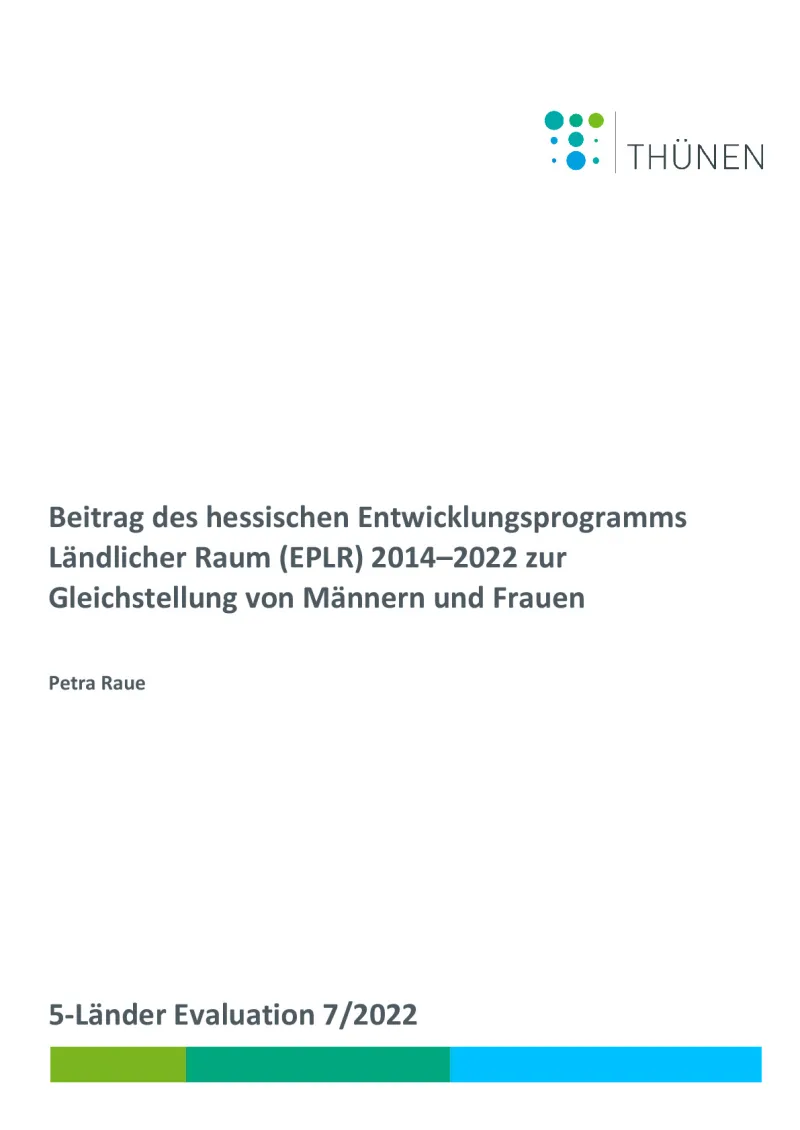Contribution of the Hessian Rural Development Programme to equality between men and women
This evaluation report focuses on how the 2014-2022 Hessian Rural Development Programme (RDP) has contributed to the cross-cutting objective of gender equality.
- Germany
- 2014-2022
- Socio-economic impacts


This evaluation report focuses on equality between men and women and examines the extent to which this cross-cutting objective has been and will be taken into account in the planning and implementation of the RDP.
The evaluation of the cross-cutting objective of equality includes two levels. The first level is gender mainstreaming as a strategy and the second focuses on equality as a goal of gender mainstreaming.
On the one hand, gender-specific analyses of the existing data were carried out and, on the other, specific questions were integrated into surveys and interviews.
Also, a screening of the LEADER regional development concepts and integrated rural development concepts was carried out with regard to the consideration of the cross-cutting objective.
The evaluation is based on the analysis of documents such as the Hessian RDP, guidelines, selection criteria, implementation reports and funding data. Moreover, it is based on various surveys carried out in the context of the five-country evaluation. Analyses of the existing data were gender-disaggregated and specific questions were integrated into surveys and interviews. In addition, interviews with three selected members of the working group 'Women in Rural Areas' and representatives of the Managing Authority were carried out in 2021.
Also, specific quantitative indicators to measure significant differences in the life situations of men and women were taken into account, for example, the EU Gender Equality Index, gender care gap, gender pay gap and EIGE Gender Equality Index, share of farm managers by gender. Key areas in which inequality exists are education and participation in unpaid domestic and care work.
Rural areas are particularly important because of disparities in the agricultural sector, inadequate representation of women in local politics and administration, and, in some rural regions, low attractiveness as a place to live and work and the associated higher out-migration of young women.
It is mentioned that the available data on some measures (e.g. sub-Measure 7.2 (Small infrastructures), sub-Measure 16.4 (Regional value chains) and sub-Measure 16.1 (EIP-Agri)) were still not sufficient for final conclusions at the time of the evaluation. However, these measures are expected to have little impact on gender equality.
The evaluation concludes that gender mainstreaming has been insufficient in the RDP so far. It shows deficits in the implementation of gender mainstreaming at programme level in the SWOT, programme strategy, and measure design. Women's participation in steering committees of rural development and the decision-making bodies of the LEADER regions is insufficient.
The evaluation found that two-thirds of the planned public funds are allocated to measures classified as gender-neutral. About one-third is used for measures in fields of action relevant to gender equality. Within this third, only a small part is used for funding measures that also consider gender equality in their design.
Among other things, the Managing Authority has taken positive steps towards improving the integration of gender mainstreaming in the implementation of the RDP, for example, with the support of the working group 'Women in Rural Areas'. The MA has contributed to the networking, visibility and capacity building of the working group and its development into the 'LandHessinnen' network. Thus, a positive contribution to gender equality was made with technical assistance funds. Sub-Measure 16.7 helped women to re-enter the labour market with the project 'Comeback online'. Within the framework of promoting diversification, basic services and LEADER, there have been positive contributions to gender equality.
Overall, men benefit more from RDP funding than women. For example, men have significantly more opportunities to influence the programme and its implementation in LEADER regions, rural development, operational groups of the EIP-Agri or in the Monitoring Committee of the RDP Hesse, and are significantly more frequent recipients of funding.
Author(s)
Petra Raue, Thünen Institute